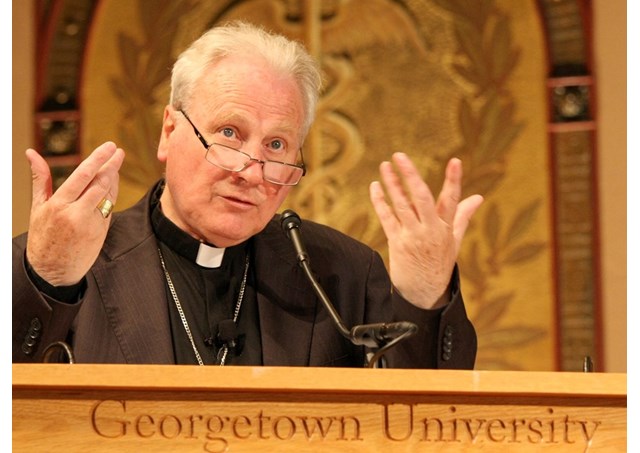
AB Fitzgerald: Vatican II's legacy of interfaith relations

(Vatican Radio) The Catholic Church this week celebrates the 50th anniversary of the Second Vatican Council declaration, Nostra Aetate, which radically changed the relationship with people of other faiths. Issued on October 28th 1965, the document for the first time urged Catholics to recognize the truth present in other religions and to work together for the benefit of all of humanity.
Over the past half century, the message of that document has been taken up by interfaith groups across the globe, often promoted and coordinated by the Pontifical Council for Interreligious Dialogue. The former president of that Council, Archbishop Michael Fitzgerald, was a key speaker at a recent conference at Georgetown University In Washington DC. The encounter was organised by the Ecclesiological Investigations International Research Network to discuss the ecumenical and interfaith legacy of the Second Vatican Council.
Archbishop Fitzgerald spoke to Philippa Hitchen about the different forms of dialogue and about the challenges facing those engaged in interfaith work today.
Listen to the full interview:
Archbishop Fitzgerald says when we talk of dialogue we think of people sitting down at table discussing theological themes, but that is not what the term really means. The documents that followed in the wake of the Second Vatican Council, he says, took their lead from the Asian bishops and spoke of four types of dialogue: dialogue of life, dialogue of action, dialogue of discussion and dialogue of religious experience…..we respect other people and the way they are seeking for God, he says, which helps us to persevere in our attempts to live peacefully together.
Half a century ago, he notes that Nostra Aetate caused great surprise by saying - for the first time - that Christians esteem Muslims for the way they worship the one God and practice prayer, fasting and almsgiving. There are things we can learn from Muslims, he says, but if we think we have everything and others don’t have anything at all to offer us, we won’t get anywhere, so “willingness to learn from the other” is the precondition for dialogue….
Speaking of the situation in Jerusalem where he lives now, Archbishop Fitzgerald says that ecumenically there has been progress but the political situation continues to prevent Christians, Muslims and Jews from associating and working to ease tensions. Recalling Pope Francis’ visit to Jerusalem in May 2014 and his invitation to Palestinian President Abbas and Israeli President Perez to pray for peace with him in the Vatican, Fitzgerald says interreligious dialogue teaches us not to expect immediate fruits from our actions, so the Pope’s gesture “may produce its fruit in good time”.
Reflecting on the progress that has been made in interfaith relations since Vatican II, the former head of the Pontifical Council points to a document released by the Bishops Conference of England and Wales (Meeting God in Friend and Stranger) encouraging interfaith dialogue and showing that “the official teaching of the Church is in this line”. He also praises the actions pioneered by French bishops such as Cardinal Philippe Barbarin, who travelled to Algeria with a local Muslim leader, and Bishop Michel Dubost, who brought a delegation of Muslims to the Vatican at the time of the Charlie Hebdo massacre.
| All the contents on this site are copyrighted ©. |


